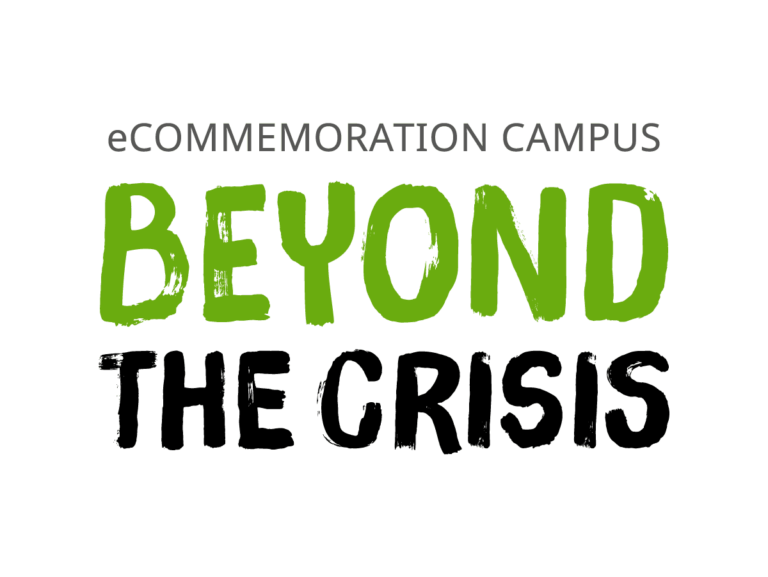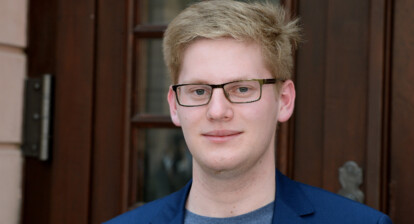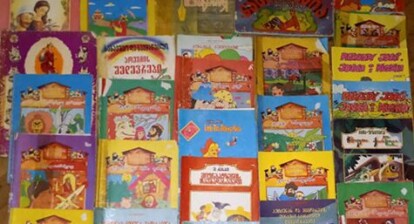The Power of Hope
in Wartimes
in Wartimes
How Georgians remember World War II
By Mariami, participant of the eCommemoration Campus 2020
Imagine a tiny mountainous Georgian village in early 1942. No death notifications have arrived yet. People hope that the war will end soon. Optimistically, villagers decide to build a new school for their children. This decision will become the shiniest light in the darkness of wartime – and a symbol of hope many years later.
Numbers and People
Like in other Soviet countries, "The Great Patriotic War" (a Soviet term for WWII) started in Georgia in June 1941.
Approximately 700,000 Georgian soldiers fought in the war – 300,000 of them never came back, as the Ministry of Foreign Affairs of Georgia states. There are many numbers and statistics connected to the Second World War.
But our protagonists have more to tell than official data could ever do: personal stories.
The protagonists of this story:
Approximately 700,000 Georgian soldiers fought in the war – 300,000 of them never came back, as the Ministry of Foreign Affairs of Georgia states. There are many numbers and statistics connected to the Second World War.
But our protagonists have more to tell than official data could ever do: personal stories.
The protagonists of this story:
Rozeta
Born in 1932
Former teacher
88 years old now
Former teacher
88 years old now
Nutsa
Born in 1928
Former librarian
92 years old now
Former librarian
92 years old now
Giorgi
Born in 1923
Soldier
Missing since 1943
Soldier
Missing since 1943
The story begins in the village of Orkhvi, located in Lechkhumi, Georgia. More than 600 people lived there back in the late 1930s. During the war, 162 of them left their homes – and only 29 came back (according to the data of military commissariat of Tsageri). Sadly, our protagonist Giorgi was not one of them.
What happened to people who stayed in the village? Rozeta and Nutsa were children at that time, their memories are full of wartime stories. They remember how the people survived, how solidarity and the hope for a better future shaped their minds.
The Hope to See
the Loved Ones Again
the Loved Ones Again
Rozeta was eight years old in 1941. 'I used to sit down on the ground at the end of my garden. From this place I could see the main road. I was there every day, looking forward to meeting my cousin. I wanted to be the first person who hugged him and tell mom he was back. I was super excited when I imagined this picture'.
Rozeta was not the only one expecting loved ones to come back. 'I hope my letters find their way home because I did not get any of yours', Giorgi wrote to his brother in 1942. Giorgi was a soldier and had maintained contact with his family all the time. In one of his letters he shortly mentioned that sometimes he dreams about the day he would return home.
Stories of waiting and believing that everything would end happily go even beyond. According to Nutsa, several families received death notifications but did not trust them. For these people, hope was more powerful than any facts.
Rozeta was not the only one expecting loved ones to come back. 'I hope my letters find their way home because I did not get any of yours', Giorgi wrote to his brother in 1942. Giorgi was a soldier and had maintained contact with his family all the time. In one of his letters he shortly mentioned that sometimes he dreams about the day he would return home.
Stories of waiting and believing that everything would end happily go even beyond. According to Nutsa, several families received death notifications but did not trust them. For these people, hope was more powerful than any facts.
Listen to the story of Nutsa
Nutsa tells the story about her brother, who never came back from WWII.
On the photo Nutsa (right, standing) is with her aunts and cousins in 1947. (photo: private)
On the photo Nutsa (right, standing) is with her aunts and cousins in 1947. (photo: private)
When Tragedy Leads To Unity
There is a quote by John Krakauer: 'Happiness is real when shared.'
If you ask elders of Orkhvi, they would add that the same holds true for grief.
'It were neighbors first, then everyone gathered around the family who just received the death notification. After mourning and crying, everyone except from family members started to do daily tasks like cooking dinner, try to find at least some food for the meals or to take care of the crops. Everything was done to help this family', Nutsa told me. She was a child during that time and used to follow her mother wherever she went.
Villagers did not only share the grief, but nearly everything. It was common to ask a neighbor for food and clothing. People became more empathetic and welcoming to each other. The village was a little isolated society, and unconsciously everyone realized that trying to cope with crises together was the only way to get through it.
'It was a hard time, everyone was poor and hungry, but at least we had hope and each other', Rozeta remembered during our interview – and continued with another story: the story about the school.
If you ask elders of Orkhvi, they would add that the same holds true for grief.
'It were neighbors first, then everyone gathered around the family who just received the death notification. After mourning and crying, everyone except from family members started to do daily tasks like cooking dinner, try to find at least some food for the meals or to take care of the crops. Everything was done to help this family', Nutsa told me. She was a child during that time and used to follow her mother wherever she went.
Villagers did not only share the grief, but nearly everything. It was common to ask a neighbor for food and clothing. People became more empathetic and welcoming to each other. The village was a little isolated society, and unconsciously everyone realized that trying to cope with crises together was the only way to get through it.
'It was a hard time, everyone was poor and hungry, but at least we had hope and each other', Rozeta remembered during our interview – and continued with another story: the story about the school.
Common Hope as a Way To Survive
There was only a tiny school building in Orkhvi, but as the population of the village kept growing, authorities planned a new building. Until the war, which changed everything. Obviously, no one had time or resources for the construction project anymore. But one day, the women in the village took over responsibility:
'I remember how hard women worked. Everybody was so determined and motivated to finish the process, to create something new and good for our village', Rozeta told, who was in the 4th grade by the time.
During the war, the school became a symbol of the future. The common belief that everything would come out all right after the war united people and gave them strength to finish their work. Maybe this was an attempt to escape from reality, to forget about ongoing tragedies and to focus on other, more positive things instead. Nutsa even remembers other kids who enthusiastically played in the schoolyard and talking about future classes.
Until 2014, this building had been playing an important role in village life. 6 years ago, the school moved into another building and the only thing left in the aboandoned blue house is silence. But for a long time, it had been a very special place: for years, it had been the only place of remembrance of WWII in Orkhvi.
'I remember how hard women worked. Everybody was so determined and motivated to finish the process, to create something new and good for our village', Rozeta told, who was in the 4th grade by the time.
During the war, the school became a symbol of the future. The common belief that everything would come out all right after the war united people and gave them strength to finish their work. Maybe this was an attempt to escape from reality, to forget about ongoing tragedies and to focus on other, more positive things instead. Nutsa even remembers other kids who enthusiastically played in the schoolyard and talking about future classes.
Until 2014, this building had been playing an important role in village life. 6 years ago, the school moved into another building and the only thing left in the aboandoned blue house is silence. But for a long time, it had been a very special place: for years, it had been the only place of remembrance of WWII in Orkhvi.
Listen to the Story of Rozeta
Rozeta about her happy childhood memories during wartimes.
On the photo: Rozeta (on the top left side) with other teachers in 1974. (photo: private)
On the photo: Rozeta (on the top left side) with other teachers in 1974. (photo: private)
Fragments of Georgian Remembrance

Currently, remembrance of WWII is fragmental in Georgia. May 9th is the day when everyone starts speaking about it but forgets the very next day. Every source, including school textbooks, is very basic, only fact-oriented and monumental. There are neither published soldier diaries nor books showing the ordinary people's perspective. It belongs to the legacies of Soviet propaganda, whose aim has always been to create the image of a 'great' victory in order to hide any mistake or crime – also to make people believe in Stalin's genius mind and enhance his glory.
And things have not changed a lot. Today's cities are full of memorials and monuments, but no individual experiences can be seen, neither in the streets and squares nor in museums or official buildings.
We started our journey in the small village of Orkhvi and I would like to let it end here. The war ended, some soldiers came back, but many others, like Giorgi, had fallen.
No one had seen him since May 1943.
As his niece told me, there were many more letters of him, but only two of them are left. Giorgi's mother kept them for 31 years and, before her death, asked her grandchildren to put them in her grave. Giorgi's elder sister stole two letters and kept them – for herself and future generations.
And things have not changed a lot. Today's cities are full of memorials and monuments, but no individual experiences can be seen, neither in the streets and squares nor in museums or official buildings.
We started our journey in the small village of Orkhvi and I would like to let it end here. The war ended, some soldiers came back, but many others, like Giorgi, had fallen.
No one had seen him since May 1943.
As his niece told me, there were many more letters of him, but only two of them are left. Giorgi's mother kept them for 31 years and, before her death, asked her grandchildren to put them in her grave. Giorgi's elder sister stole two letters and kept them – for herself and future generations.

Nowadays, both letters belong to Giorgi's niece, who is going to donate them to the museum. (photo: private)
Rozeta's Board

The old school building in 2018
(photo: private)
(photo: private)
In the village, however, students took their seats in the new classrooms. Resuming that everyone lived happily ever after would be great and easy, but things are not that simple. Every person, every family had experienced their own tragedies. People kept them in their memories while the government did not grant space for sadness or burdening stories in the official remembrance. Orkhvi became a part of the common Soviet memory politics like it was practised all over the country. But in Orkhvi one place was different.
Remember Rozeta? She became the school warden in 1969. She collected photos of lost soldiers and created a memorial board. Henceforth, every big school event took place in front of this board, which became the only place to remember the personal tragedies of the villagers.
What happened to that board, you may ask. Unfortunately, it does not exist anymore. During the reconstruction in 2009, it was accidentally destroyed. This very important piece of remembrance and history was destroyed forever. And one day, there will be no more contemporary witnesses to tell their stories.
That's why society needs to start rethinking and reevaluating the past even though it might not be about pleasant and heroic times only. Listening to the individual fates and stories of resistance may help us to cope with modern crises.
Remember Rozeta? She became the school warden in 1969. She collected photos of lost soldiers and created a memorial board. Henceforth, every big school event took place in front of this board, which became the only place to remember the personal tragedies of the villagers.
What happened to that board, you may ask. Unfortunately, it does not exist anymore. During the reconstruction in 2009, it was accidentally destroyed. This very important piece of remembrance and history was destroyed forever. And one day, there will be no more contemporary witnesses to tell their stories.
That's why society needs to start rethinking and reevaluating the past even though it might not be about pleasant and heroic times only. Listening to the individual fates and stories of resistance may help us to cope with modern crises.
Sources: Into the Wild by John Krakauer (1986); https://obd-memorial.ru/html/
All photos are private.
All photos are private.





